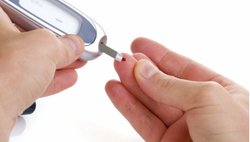 Already years ago it has been noticed that stress and severe injury results in insulin resistance among ICU patients. This also occurs in patients who had no diabetic problems before an insult. Van den Berge et al. therefore postulated that an intensive glucose control in ICU patients would be of benefit. And indeed, in 2001 they published the well known article on intensive insulin therapy in critically ill patients. They showed that a tight glucose control results in reduced morbidity and mortality (by 42%) among ventilated, critically ill patients in surgical intensive care units (1548 patients included). Unfortunately though some clinical trials since have failed to reproduce this benefit of tight glucose control. A meta analysis in JAMA 2008 looked at 28 randomized controlled trial with a total of 8432 patients and found that tight glucose control was not associated with significantly reduced hospital mortality but an increased risk of hypoglycemia. The multinational NICE-SUGAR trial, including 6104 patients, finally made an end to tight glucose control on most ICU’s around the world. Against expectation mortality in the intensive-control group was higher as well as severe hypoglycemia. No difference though was observed in regards of length of stay in ICU, duration of hospitalization, days of mechanical ventilation, rate of pos. blood cultures and RBC transfusion. This month Kalfon et al. add another puzzle piece to this ongoing discussion with an article published in Intensive Care Medicine. This multi-center randomized trial included 2648 patients who were randomly assigned to tight computerized (CDSS) glucose control or conventional glucose control. And guess what: tight glucose control did not change 90-day mortality but was associated with more frequent severe hypoglycemia... In summary: there is not much in favor for tight glucose control coming up and there’s no need to invest in more expensive computers... Sweet! Kalfon P. et al. Intensive Care Med. 2014 Jan 14 van den Berghe, G. et al. Intensive insulin therapy in critically ill patients. N. Engl. J. Med. 345, 1359–1367 (2001) NICE-SUGAR study investigators. Intensive versus conventional glucose control in critically ill patients. N. Engl. J. Med. 360, 1283–1297 (2009) Wiener, R. S., Wiener, D. C. & Larson, R. J. Benefits and risks of tight glucose control in critically ill adults: a meta-analysis. JAMA 300, 933–944 (2008) Comments are closed.
|
Search
|


 RSS Feed
RSS Feed


